水墨丹青
2016-10-25
水墨丹青
DREAM A LITTLE DREAM
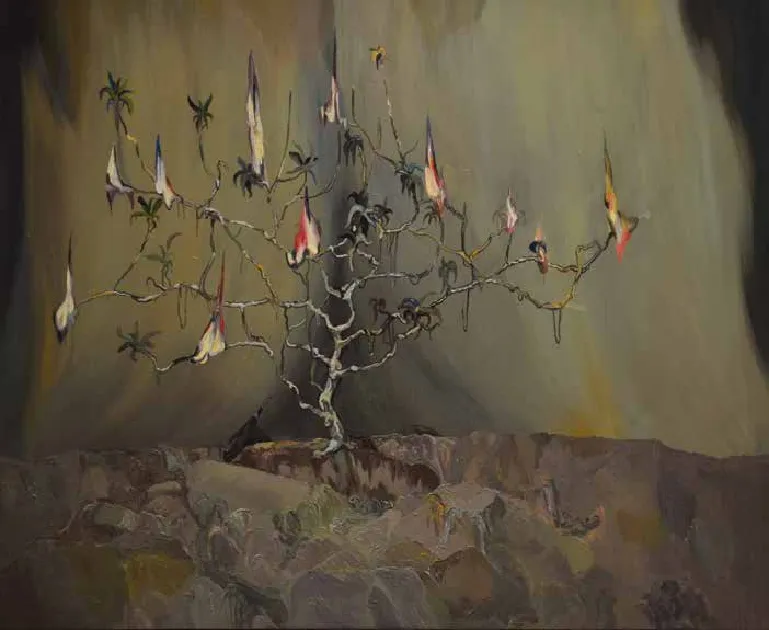
A Tree On A Plain, 2010
Regarding your latest exhibition “Kaifeng Blues”, does“blues” refer to a depressive mental condition, or is it just a literary metaphor?
The exhibition includes my paintings from 2008 to 2016,but they are still just a small portion of my body of work. For several years, I was stuck in depression, but in general,it refers to a haunting mood of alienation that I feel about my surroundings.
Most of your paintings are on paper rather than canvas or another medium. Is that a deliberate choice?I'm obsessed with paper, its texture, color, and even its smell. Painting on paper is an old habit. It's more convenient compared to canvas, and its size is easier to manage. Among these paintings I used a smooth paper with a shiny glow. I found it by accident in Henan. It's different to rice paper in that the color doesn't show through, but leaves all traces on the surface. It's thin, but it gives out a hallucinatory shine. Using Henan-produced paper to paint places in Henan is a very intimate feeling. I think it's appropriate. The paper is like a context, but it is also part of the object that I'm depicting.
In the dark room at the exhibition, walls are covered in dream-like languages. Are those your dreams?Over the last two years, I would wake up in the middle of the night halfway through my dreams, grab the phone by my pillow, type down the dream, and send it to my mailbox. When the curator Zhuzhu and I were creating this exhibition, we came up with this idea of writing something from me on the walls, and the only thing I'd written were those dreams, so I dug them up. I asked my 18-year-old daughter to write them down with chalk. She agreed because I paid her ten yuan to write each
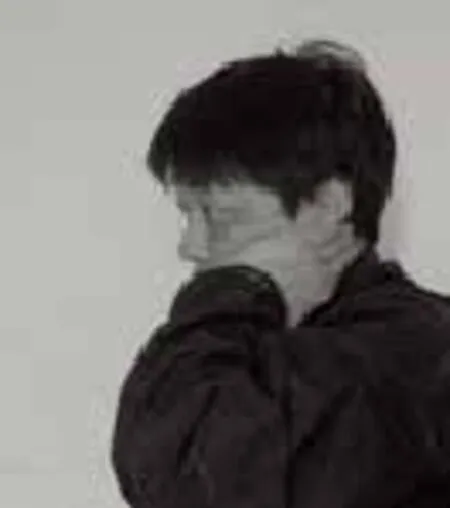
Wang Qing (王顷)Born in Henan in 1968, Wang Qing graduated from the Oil Painting Department of the Central Academy of Fine Arts, Beijing, in 1996. He's now a lecturer at the Tianjin Academy of Fine Arts. His paintings carry a sticky tone, grayish that mirrors the artist's inner world.
line. When she fnished writing, however, she was very sad. She said to me, ‘Dad, I didn't know that you were like this.' It was a very emotional moment.
How do you think your works ft into the larger context of globalization?Most of my artworks originate not from big concepts, but from very private experiences,like an impression from an old movie that I've seen or a memory that I carry with me. More than once I have dreamed of a shabby street,and in these dreams it seems like a foreign country or Beijing. But, it is also obvious to
me that it is Shangqiu or Kaifeng (both places in Henan). This, I think, is the power of ambiguity. - Ll YANTlNG (李妍婷)
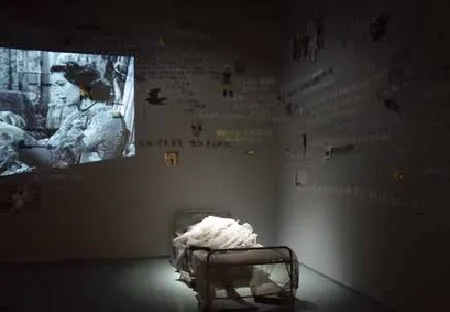
The Room, 2016
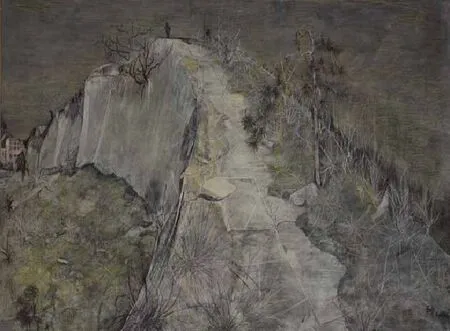
A Winter, 2014
CHAOS CAN BE DULL
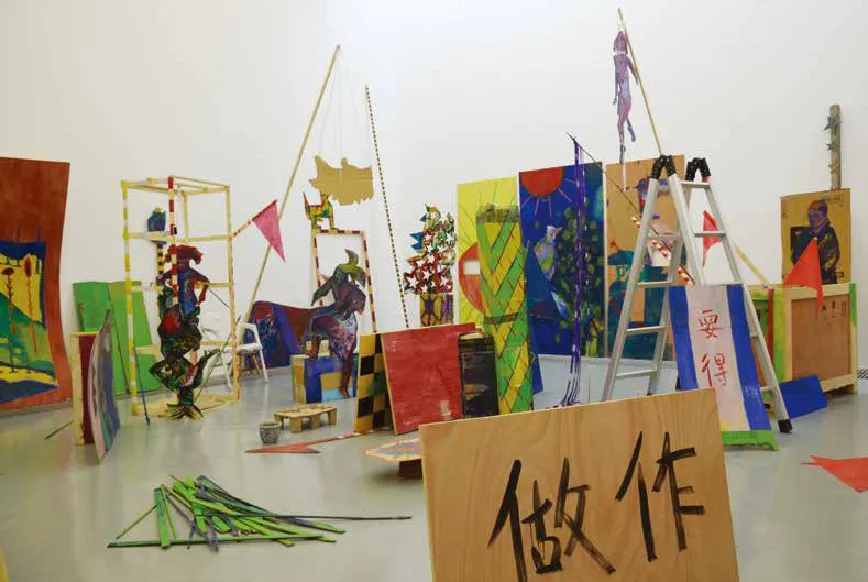
MA, 2016
Ma Jianfeng's latest exhibition “MA” is an unprecedented, nonsensical prank.
The main hall of the gallery is stacked with piles of recycled cardboard boxes, upon which a layer of famboyantly colored patterns,which seem to be doodled with no intentional design, has been painted. A few numbers are scattered about, obviously serving as a sort of bait for logic and rationality. And, as visitors raise their heads amid this disturbing maze of boxes, colors, and numbers, their eyes meet three fuzzy posters of...horses. No joke.
The corridor leading to the next hall is blocked by wood planks. As you navigate through, sliding past more heaps of garbage, the view suddenly opens up to what can only be described as the “artist's studio”, meaning works in progress.
A ladder stands in the middle of the room while a mangled cardboard fgure is balanced on top. Red fags and roosters are put together in a cart, while eggshells and a fower pot lie next to a red arrow. A blue fag leans against a wall, on which, inscribed in gold marker is the message: “blah blah blah”.
It is such a horrible mess—as if the paint buckets had exploded and these tragic little cardboard fgures run out screaming because they cannot stand the unbelievable dullness. Meanwhile, red plastic stripes tied to the electricfan (as part of the exhibition) make rhythmic whooshing sounds—and even that is boring.
It's obvious that Ma's new exhibition is a valiant attempt in a strange feld. Yet, to make a chaotic scene of disorder and call it a search for new logic, to paint on randomly picked materials rather than canvass and call this profound,is too much.
While it's hard to disapprove of Ma's search for whatever questions he has in mind, his exhibition“MA” refects a disoriented artist who has set out to search for a new order but circles back to the origins of absolute chaos. - L.Y.
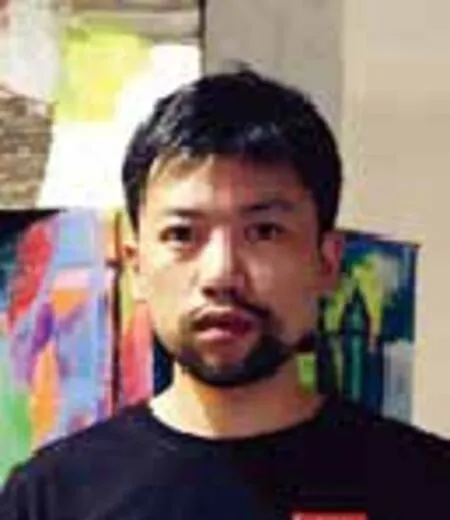
Ma Jianfeng (麻剑锋)
Born in 1983 in Zhejiang Province, Ma Jianfeng graduated from the Fresco Painting Department at the School of Public Art under the China Academy of Art in 2012. His works involve fragmented objects and are said to consist of unfettered conceptions of painting and spatial relationships. Ma currently lives and works in Beijing.
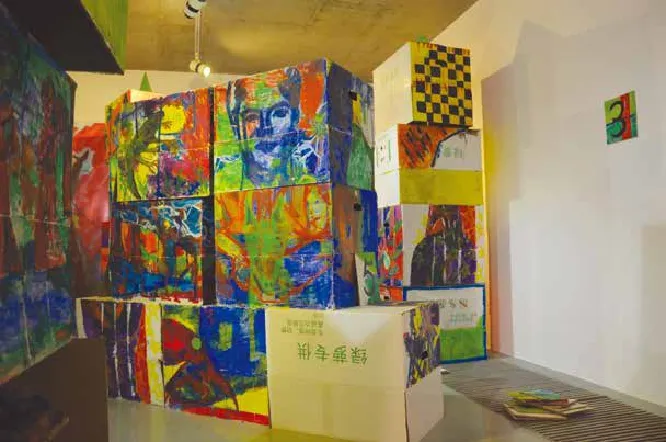
MA, 2016
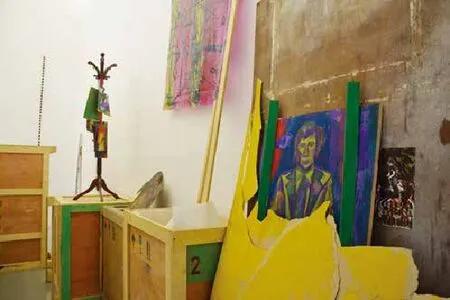
MA, 2016
